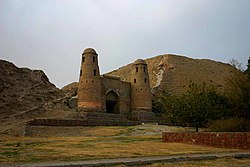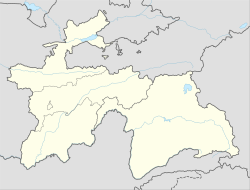Hisor (Tajik: Ҳисор) or Hisar (Russian: Гиссар, Gissar) is a city in western Tajikistan, about 15 km west of Dushanbe. The city was the seat of the former Hisar District, and is part of the Districts of Republican Subordination. It lies at an altitude of 799–824 m, surrounded by high mountains (Gissar Range to the north, Babatag and Aktau ranges to the south).[2] The river Khanaka, a tributary to the Kofarnihon, flows through the town. Its population is estimated at 29,100 for the city proper and 308,100 for the city with the outlying communities (2020).[3] As of 2002, its population was composed 81.6% of Tajiks, 12.3% Uzbeks, 3.6% Russians, and 2.5% others.
Hisor
Tajik: Ҳисор | |
|---|---|
 Old castle in Hisor | |
| Coordinates: 38°31′35″N 68°32′17″E / 38.5264°N 68.5381°E | |
| Country | |
| Region | Districts of Republican Subordination |
| Elevation | 802 m (2,631 ft) |
| Population (2020) | |
| • City | 308,100 |
| • Urban | 29,100 |
| Time zone | UTC+5 |
History
editThe fort of Hisar, residence of the Bukharan governor, is said to date back to Cyrus the Great and to have been captured twenty one times.[4]
In 1504 the region was conquered by Muhammad Shaybani.[5] Babur briefly conquered Hisar in 1511, but came back under control of the Uzbeks not long after. Hisar became a semi-independent principality in the next few decades and was ruled by a sultan, furnishing troops for Bukhara's military campaigns.[5] In the 17th century the Tajiks became the dominant power in the region, obtaining the governorship of Hisar. During this period the Bukharan khanate was split between the khan in Bukhara and the ruler (usually one of his relatives) in Balkh, and Hisar was generally subordinate to the latter. The decline of Bukharan power after the assassination of Ubaydullah Khan in 1711 resulted in Hisor asserting its independence.[5]
Hisar was made a city on June 26, 1993.
Subdivisions
editBefore ca. 2018, Hisar was the seat of Hisar District, which covered the rural part of the present city of Hisar isor.[6] The city of Hisar covers Hisar proper, the town Sharora and ten jamoats.[7] These are as follows:[8]
| Jamoat | Population (Jan. 2015)[8] |
|---|---|
| Sharora (town) | 12,700[6] |
| Almosi | 21,261 |
| Dehqonobod | 20,686 |
| Durbat | 20,052 |
| Hisor | 32,912 |
| Khonaqohikuhi | 27,624 |
| Mirzo Rizo | 25,971 |
| Mirzo Tursunzoda | 20,303 |
| Oriyon | |
| Navobod | 26,321 |
| Somon | 28,691 |
Geography
editClimate
editHisar has a hot-summer Mediterranean climate (Köppen climate classification Csa). The average annual temperature is 14.1 °C or 57.4 °F. The hottest month is July with an average temperature of 23.9 °C or 75.0 °F and the coolest January with an average temperature of 1.7 °C or 35.1 °F. The average annual precipitation is 568 millimetres or 22.36 inches and there is an average of 90.5 days with precipitation. The wettest month is March with an average of 107.2 millimetres or 4.22 inches of precipitation and the driest month is August with an average of 0.8 millimetres or 0.03 inches.[1]
| Climate data for Hisar | |||||||||||||
|---|---|---|---|---|---|---|---|---|---|---|---|---|---|
| Month | Jan | Feb | Mar | Apr | May | Jun | Jul | Aug | Sep | Oct | Nov | Dec | Year |
| Daily mean °C (°F) | 1.7 (35.1) |
3.2 (37.8) |
8.5 (47.3) |
14.6 (58.3) |
18.9 (66.0) |
23.9 (75.0) |
26.2 (79.2) |
24.6 (76.3) |
19.9 (67.8) |
14.2 (57.6) |
9.0 (48.2) |
4.6 (40.3) |
14.1 (57.4) |
| Average precipitation mm (inches) | 65.7 (2.59) |
73.4 (2.89) |
107.2 (4.22) |
105.0 (4.13) |
86.2 (3.39) |
7.4 (0.29) |
3.8 (0.15) |
0.8 (0.03) |
3.1 (0.12) |
30.8 (1.21) |
43.2 (1.70) |
59.4 (2.34) |
568.0 (22.36) |
| Average precipitation days (≥ 0.1 mm) | 11.0 | 12.2 | 14.8 | 12.9 | 10.2 | 2.9 | 1.5 | 0.6 | 1.1 | 5.4 | 7.3 | 10.6 | 90.5 |
| Average relative humidity (%) | 67.7 | 66.8 | 63.8 | 60.6 | 54.0 | 41.3 | 39.3 | 40.6 | 43.1 | 52.1 | 57.9 | 65.6 | 54.4 |
| Source: "The Climate of Hisar". Weatherbase. Retrieved 2 August 2014. | |||||||||||||
References
edit- ^ a b "Climate of Hisor". Weatherbase. Retrieved 4 August 2014.
- ^ Atlas of Soviet Republics of Central Asia, Moscow, 1988, in Russian, p. 48.
- ^ "Population of the Republic of Tajikistan as of 1 January 2020" (PDF) (in Russian). Statistics office of Tajikistan. Archived from the original (PDF) on 15 March 2023. Retrieved 8 October 2020.
- ^ "Hisor and Hisar Fortress travel guide". Caravanistan. Retrieved 2019-08-23.
- ^ a b c Wilde, Andreas (2016). What is Beyond the River?: Power, Authority, and Social Order in Transoxania 18th-19th Centuries. Verlag der Österreichischen Akademie der Wissenschaften. ISBN 978-3-7001-7866-8.
- ^ a b "Population of the Republic of Tajikistan as of 1 January 2015" (PDF) (in Russian). Statistics office of Tajikistan. Archived from the original (PDF) on 2 July 2015.
- ^ "Regions of the Republic of Tajikistan 2017" (PDF) (in Russian). Statistics office of Tajikistan. pp. 15–21. Archived from the original (PDF) on 28 March 2022. Retrieved 12 October 2020.
- ^ a b Jamoat-level basic indicators, United Nations Development Programme in Tajikistan, accessed 8 October 2020
External links
editMedia related to Hisor at Wikimedia Commons
